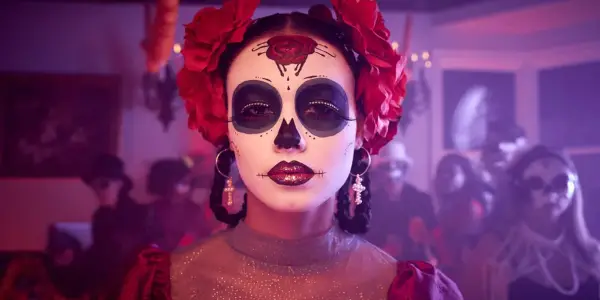SXSW 2021 Review: R#J: A Horribly Misguided Experiment

Kevin L. Lee is an Asian-American critic, producer, screenwriter and…
Can you imagine if every sentence of this review is accompanied by the sounds of me groaning as I type? That would get annoying real quick, wouldn’t it? You’re gonna be hearing a whole lot of sighs and grunts in this 90-minute affair, as characters react and respond to text messages from start to finish. That is one out of many misguided decisions made in R#J, a modern re-telling of Romeo & Juliet for the Gen-Z Instagram age.
Writer/director Carey Williams had a style and visual aesthetic in mind – tell the entire story through iPhone screens. This is Romeo & Juliet condensed into Instagram DMs, texts, and FaceTime’s. Certainly, screen capture narrative has been an approach that, when done right, I have championed in the past (Searching, the Unfriended films). The problem here is twofold: there is very little thematic payoff that justifies the visual approach and the approach itself is inconsistent in its execution.
Inconsistent Approach
For a film told entirely on an iPhone, I found the display to be uncomfortably zoomed in. There is almost never a real “wide shot” where we can see the entire home screen. What we get instead is a series of artificial pans and tilts that are so up close, I could not stop thinking about what kinds of corners the animators and editors were potentially cutting in the editing room. It also doesn’t help that each shot is painfully obvious in what Williams wants us to pay attention to. Will she or will she not unmute him? Let’s have the entire shot be a closeup of that mute button so we can see it clearly!

But perhaps the most distracting thing about this approach, which irritated me throughout its runtime, is how the characters communicate with one another. When it comes to the Instagram DMs, everyone texts like a present-day Gen-Z high schooler. Their messages contain “lmao,” “hbu,” and plenty of GIFs and memes. In fact, the movie takes a step further to ensure us that Romeo (Camaron Engels) is in fact a part of #FilmTwitter, with his phone filled with apps like Kanopy, Criterion Channel, and Letterboxd. But once the FaceTime calls start and the in-person interactions happen, the characters start reciting Shakespeare’s lines. Juliet (Francesca Noel) texts an emoji at one second but once the camera turns on and she speaks to Romeo, she says her classic “Wherefore art thou Romeo” line. It is one of the most mind-boggling storytelling decisions I have seen in recent memory. Hilariously, we now have not one but two Romeo and Juliet movies with baffling directing decisions. At this point, everyone knows the story of the Montagues and the Capulets. Why we still have to recite Shakespeare’s lines word for word is beyond me.
Having familiar content is one thing, but having a predictable form is the real test of patience, and unfortunately, I quickly ran out of it within the first ten minutes. Remember, this is a 90-minute movie, and aside from the ending, there are practically no surprises in the storytelling here.
The Approach Hurts the Performances
Another concept that Williams doesn’t seem to understand or care about is that screen capture films like Searching frequently have their actors shown on screen. We see John Cho‘s character at his most vulnerable moments, which gives that film both an intimate and invasive experience. Even when we watch his character click and type things on the laptop, they are either accompanied by his face on the side of the story is constantly pushed forward by its mystery plot so there is always something happening that demands our involvement.
Williams locks in on the Instagram DMs here to the point where we frequently lose access to the characters. The only place in the film that tells us our titular characters are falling in love is a montage of their text messages going back and forth, which by the way I must stress that we don’t actually get to read most of those messages because the clear purpose of the shot is to show us “Hey, look how many messages they sent one another! They must be bonding and falling in love!” Romeo and Juliet are barely in the same room together in the film, and because the shot is more concerned with showing us text rather than showing us the characters’ facial reactions and physical interactions, we are left with nothing but hearing sighs and groans when the characters read and type things. As I’ve already mentioned in the beginning of the review, this “technique” ages like milk.

Engels and Noel certainly try their best, but this very screen capture approach handicaps their opportunities to truly work off of one another and create fire in their chemistry. Aside from two commendable performances found in Siddiq Saunderson as Mercutio and Diego Tinoco as Tybalt, nearly every member of the cast has little to nothing but the original Shakespeare lines to work with. And may I remind you once again, they SPEAK Shakespeare but TEXT Gen-Z.
R#J: A Well-Intentioned Disaster
Given that this movie’s title isn’t actually called Romeo and Juliet, I have decided that the more fitting way to call this movie is “R Pound J,” because I certainly do feel pounded over and over again by its visual aesthetic. Aside from one admirable sequence near the third act that calls to mind how we consume the news and how social media can mutate that beyond control, the rest of R#J is a noisy, numbing ordeal. The cast cannot break this movie’s trappings, no matter how hard they try, and even though I can feel everything is well-intentioned, little to none of it resonated. Thy movie is amiss. Thus with a review, I die.
Did you see R#J? What did you think of the film? Share below!
R#J premiered at the Sundance Film Festival 2021 on January 30th, 2021. It was shown at SXSW on March 16th, 2021.
Watch R#J
Does content like this matter to you?
Become a Member and support film journalism. Unlock access to all of Film Inquiry`s great articles. Join a community of like-minded readers who are passionate about cinema - get access to our private members Network, give back to independent filmmakers, and more.
Kevin L. Lee is an Asian-American critic, producer, screenwriter and director based in New York City. A champion of the creative process, Kevin has consulted, written, and produced several short films from development to principal photography to festival premiere. He has over 10 years of marketing and writing experience in film criticism and journalism, ranging from blockbusters to foreign indie films, and has developed a reputation of being “an omnivore of cinema.” He recently finished his MFA in film producing at Columbia University and is currently working in film and TV development for production companies.













